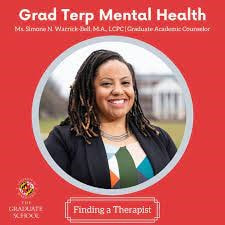 written by: Mintong Nan and Lindsay Barranco Let’s face it. Graduate school can be a wonderful experience, but there are stressors aplenty - from financial worry to time management, coping with expectations of yourself and others, all in a field of scientific research - where the nature of the work involves a high degree of uncertainty and uncharted territory1, 2. These cumulative pressures can all lead to a great deal of stress for the graduate student, especially during the COVID-19 pandemic. Thankfully, skilled and caring professionals like Ms. Simone Warrick-Bell are there if needed. Ms. Warrick-Bell has been a graduate student academic counselor for the University of Maryland (UMD) Graduate School since early 2020, and prior to 2020 she was a care manager with the UMD counseling center. She holds a Master’s in Counseling Psychology and is a licensed Clinical Professional Counselor. Her works include individual consultation sessions and leading graduate student circle sessions, which were created solely to support UMD graduate students. The entomology department was happy to welcome Ms. Warrick-Bell to our Friday seminar series and to hear more about the services she provides through the Graduate School. Ms. Warrick-Bell began by stating that being a graduate student can be a great experience, but that graduate students are six times more likely to experience anxiety or depression than others due to financial strain or advisor relations, and that marginalized groups such as women, racial/ethnic minorities or LGBTQ+ students are at even higher risk of stress1, 2. Given this reality, it can be important to be mindful of the signs of mental health to seek support such as:
Why can participating in therapy be beneficial to graduate students? It can be essential to well-being by reducing anxiety and depression, managing obsessions and compulsions, and improving cross-border relationships. In addition, receiving objective support can be especially important in that a mental health professional with some distance from the situation can often see things in a way that a friend or lab colleague might not. A therapist can often assist the students in assessing and adjusting unrealistic expectations and can help improve insight and awareness, and challenge irrational thoughts. Ms. Warrick-Bell observed that graduate students are just trying to survive graduate school. However, it would be preferable for students to be able to enjoy the graduate school experience while balancing family, social life, and academic demands. Any graduate student needing mental health support can contact Simone Warrick-Bell at [email protected] or the UMD counseling center, where they can obtain a “warm referral” to remove hurdles and find an appropriate provider to help a graduate student with complex needs, as opposed to a “cold referral”, where a graduate student is given a name and number to contact themselves. The counseling center currently offers individual counseling. Tele-therapy is a potential option both on and off campus, which can save money and time. Insurance covers mental health counseling, whether it is SHIP (CareFirst), Blue Cross/Blue Shield, United Health Care or Kaiser Permanente via an assistantship. If a graduate student is insured via a parent/partner or spouse, then support is available to assist with reviewing insurance coverage and benefits. Authors: Mintong Nan is a PhD student in the St. Leger Lab. His research is focused on how circadian rhythms affect Metarhizium infection of Drosophila. [email protected] Lindsay Barranco is a MS student in the vanEngelsdorp Bee Lab. Her research is focused on solitary ground bee nesting preference in varied soil substrates. [email protected] References:
Comments are closed.
|
Categories
All
Archives
June 2024
|
Department of Entomology
University of Maryland
4112 Plant Sciences Building
College Park, MD 20742-4454
USA
Telephone: 301.405.3911
Fax: 301.314.9290
University of Maryland
4112 Plant Sciences Building
College Park, MD 20742-4454
USA
Telephone: 301.405.3911
Fax: 301.314.9290

 RSS Feed
RSS Feed




